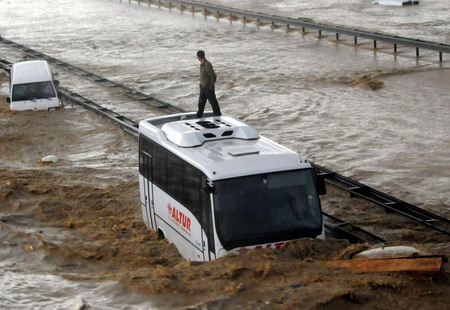Flash floods killed 31 people in northwest Turkey, sweeping through the city of Istanbul, swamping houses, turning highways into fast-flowing rivers and drowning seven women in a minibus that was taking them to work.
|

|
|
A man on a partially submerged bus waits for evacuation on a highway in Istanbul September 9, 2009.
|
Twenty-four died in Istanbul, Turkey's largest city, after two days of the heaviest rain in 80 years produced sudden flood waters which engulfed low-lying areas. Another seven died in Saray, west of Istanbul, five of whom were from the same family.
In Istanbul rescue workers, some on boats, put out planks and ladders to help drivers, stranded in fast-flowing waters, reach the safety of bridges and high land.
The worst flooding occurred in areas in the west of the city, on the European side, where drainage is often poor.
The waters began to recede late on Wednesday revealing wrecked buildings and debris scattered across the streets, as distressed residents started the clean-up.
Interior Minister Besir Atalay said the death toll could rise as waters continued to recede.
Prime Minister Tayyip Erdogan, a native of Istanbul, arrived in the city on Wednesday night, and pledged emergency relief, saying the damage would be repaired as soon as possible.
Witnesses said waves of muddy waters pulling cars, trees and debris crashed into homes and buildings early on Wednesday as people were getting up to break their fasting during the holy month of Ramadan.
"We heard a crashing sound and then saw the waters coming down carrying cars and debris," said Nuri Bitken, a 42-year-old night guard at a truck garage.
"We tried to wake up those who were still asleep in the trucks but some didn't make it. The dead had to be retrieved by boats," Bitken told Reuters.
CNN Turk television showed scenes of white blankets covering the bodies of people found in the western Halkali neighborhood near Ataturk International airport. Airport officials said there was no disruption to flights.
"My friend got stuck in the truck after the water rose all at once. The vehicle stopped working after filling with water. We rescued him with a winch," Kamil Coskun told Reuters TV in the Ikitelli district.
Istanbul's ancient district of Sultanahmet, with its mosques, the palaces of the waterfront and Beyoglu's area of narrow streets were largely unaffected.
In the Ikitelli commercial district, residents scrambled for office equipment amid debris. In other parts of the city, people waded chest-high through swamped highways.
Insurance company Axa Sigorta Deputy General Manager Ali Erlat said damage from the floods could total $70 million-$80 million, the state-run Anatolian news agency reported.
Public Works Minister Mustafa Demir, who toured the worst hit areas, said there was "huge damage to infrastructure."
Ali Erdem, chief analyst at the Istanbul Meteorology Department, told Reuters Tuesday's rainfall was the heaviest recorded in the last 80 years.
The bodies of seven women were discovered in Bagcilar, a working-class suburb of Istanbul, on Wednesday. They had drowned in a minibus that was taking them to jobs at a textile factory, Anatolian said.
Istanbul is situated on the steep banks of the Bosphorus strait, which divides Europe from Asia and is one of the world's busiest waterways -- a major conduit for cargo ships and oil tankers passing between the Black Sea and the Mediterranean.
Elsewhere in northwest Turkey, two bridges were demolished by floodwaters on the Bahcekoy-Saray highway.
Istanbul authorities have been more occupied in their disaster planning with making provisions for earthquakes in a city crossed by a major faultline. A quake killed 18,000 people in northwest Turkey in 1999.